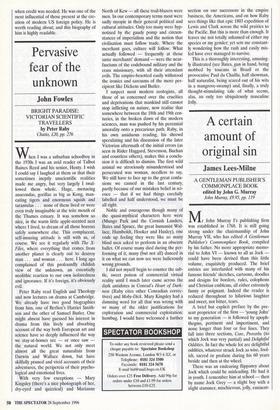Pervasive fear of the unknown
John Fowles
BRIGHT PARADISE: VICTORIAN SCIENTIFIC TRAVELLERS by Peter Raby Chatto, f20, pp. 276 When I was a suburban schoolboy in the 1930s I was an avid reader of Talbot Baines Reed and his senior, Henty. I wish I could say I laughed at them or that their sometimes ineptly unscientific realities made me angry, but very? largely I swal- lowed them whole. Huge, menacing anacondas, gorillas as big as Kong, man- eating tigers and enormous squids and tarantulas ... none of them lived or were even truly imaginable at the trite mouth of the Thames estuary. It was somehow so nice, in the warm little apple-scented nest where I lived, to dream of all those horrors safely somewhere else. This complacent, self-insuring attitude is still with us, of course. We see it regularly with The X- Files, where everything that comes from another planet is clearly out to destroy man .. . and woman . . . here. I long ago complained of this profoundly childish view of the unknown, an essentially neolithic reaction to our own isolatedness and ignorance. If it's foreign, it's obviously evil.
Peter Raby read English and Theology and now lectures on drama at Cambridge. We already have two good biographies from him, one of Berlioz's Harriet Smith- son and the other of Samuel Butler. One might almost have guessed his interest in drama from this lively and absorbing account of the way both European art and science have so deeply influenced the way we stay-at-homes see — or once saw the natural world. We not only meet almost all the great naturalists from Darwin and Wallace down, but have skilfully pruned and vivid accounts of their adventures, the peripeteia of their psycho- logical and emotional lives.
With very few exceptions — Mary Kingsley (there's a nice photograph of her, dry-eyed and quizzical) and Marianne North of Kew — all these trail-blazers were men. In our contemporary terms most were sadly myopic in their general political and cultural attitudes. Only too many were hyp- notised by the gaudy pomp and circum- stances of imperialism and the notion that civilisation must follow trade. Where the merchant goes, culture will follow. What actually followed — frequently at those same merchants' demand — were the near- fascisms of the codebound military and the crass missionary, with all their attendant evils. The empire-besotted easily withstood the ironies and sarcasms of the more per- cipient like Dickens and Butler.
I suspect most modern ecologists, all those of us concerned over the cruelties and deprivations that mankind still cannot stop inflicting on nature, now realise that somewhere between the 18th and 19th cen- turies, in the broken dawn of the modern sciences, man was pushed by his perennial amorality onto a precarious path. Raby, in his own assiduous reading, his shrewd speculating and his discussion of the later Victorian aftermath of the initial errors (as seen in Rider Haggard, Stevenson, Buchan and countless others), makes this a conclu- sion it is difficult to dismiss. The first wild animal we atrociously misunderstood and persecuted was woman, needless to say. We still have to face up to the great confu- sions we caused in the last century, partly because of our mistaken belief in sci- ence — that if we had things carefully labelled and half understood, we must be all right.
Noble and courageous though many of the quasi-mythical characters here were (Mungo Park and the Cornish Landers, Bates and Spruce, the great humanist Wal- lace, Humboldt, Hooker and Huxley), one ends up feeling they were like so many blind men asked to perform in an obscure ballet. Of course many died during the per- forming of it, many (but not all) danced in it on what we can now see were ludicrously wrong grounds.
I did not myself begin to counter the sub- tle, sweet poison of commercial virtual reality until I much later came across the dark antidotes in Conrad's Heart of Dark- ness (Raby cites other Conradian correc- tives) and Moby-Dick. Mary Kingsley had a damning word for all that was wrong with so many of the older justifications for exploration and commercial exploitation: humbug. I would have welcomed a further section on our successors in the empire business, the Americans, and on how Raby sees things like that epic 1803 expedition of Lewis and Clark across the wild prairies to the Pacific. But this is more than enough. It leaves me not totally ashamed of either my species or my gender; yet sets me constant- ly wondering how the rash and easily mis- led have ever managed to survive.
This is a thoroughly interesting, amusing- ly illustrated (see Bates, gun in hand, being mobbed by toucans in Brazil or the provocative Paul du Chaillu, half showman, half naturalist, being scared out of his wits in a mangrove-swamp) and, finally, a truly thought-stimulating tale of what seems, alas, an only too ubiquitously masculine folly.


















































































 Previous page
Previous page